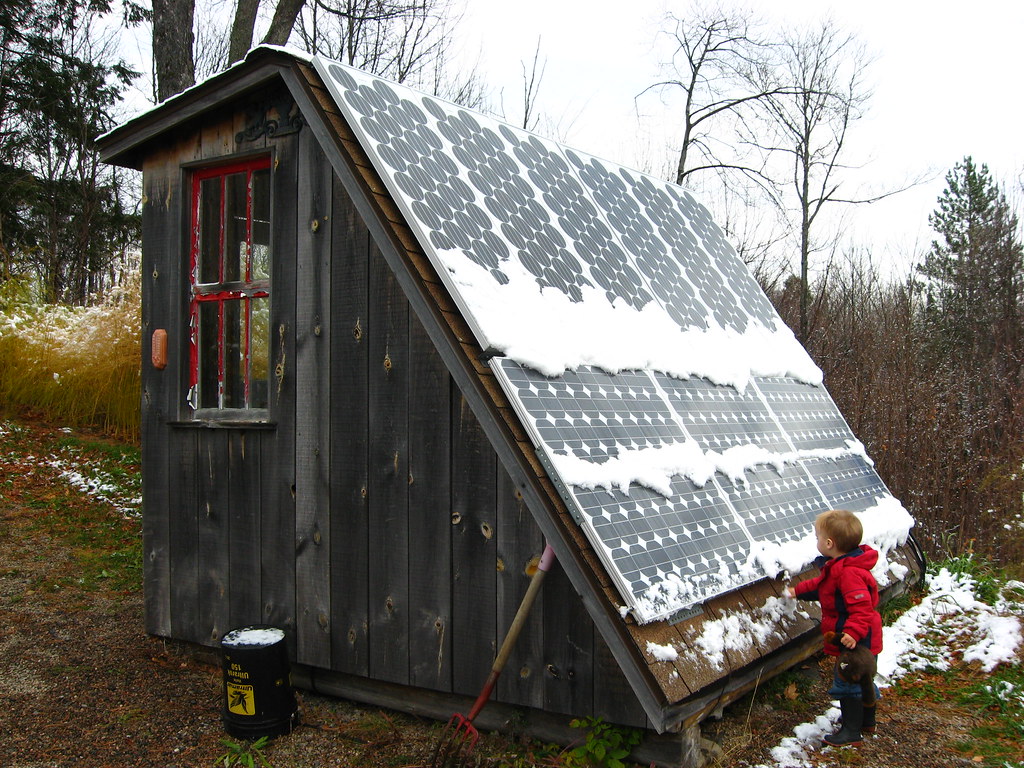 Image Credit: Jeremy Levine / flickr
Image Credit: Jeremy Levine / flickr
Taking your shed off-grid has never been easier. Our easy-to-follow guide can give your garden shed a whole new purpose. Discover how sheds can be used for so many things, beyond just storage.
With costs rising, many people find themselves spending more time at home. The good news is it doesn’t need to be boring. This may be the perfect time to convert your shed. Whether you’re a gym goer, a movie fanatic or you just want a place to relax in the evening, an off-grid shed could be a perfect solution.

Some great conversion ideas for an off-grid shed include:
- A home office – great for working at home as it provides an additional space outside the home and is perfect for those who need quiet time.
- For a children’s playhouse, an off-grid power solution is a nice feature, especially if it is a place that will be used regularly in the evenings.
- Getting a gym membership can be costly, therefore creating your own at-home setup is a great way to get fit whilst being near your own home. A garden gym can be a lifechanger.
- Take your boring garden shed and turn it into a “man cave.” There are so many interesting ways to transform your shed into a perfect getaway just a few steps from your home.
Once you’ve decided on your plan for converting your garden shed, the next step is taking it off-grid.
The pros and cons of solar power on sheds
Most shed conversions use solar energy to generate power for their off-grid shed. Although they are costly upfront you can expect a long-lasting solution to your power woes.
If you decide to go ahead with solar panels it is worth bearing in mind there are pros and cons to solar power and it is important to consider the following:
Pros of solar panels
- Reduces operating costs of power sources
- Eco-friendly
- There may be an opportunity to earn money from surplus energy
- Zero emissions
- Easier set up compared to a house roof
Cons of solar energy
- Your shed will need to be able to hold the weight of the panels
- The building needs to be big enough to house the inverter
- The panels need to face south, east, or west – but the south is recommended.
- Solar panels may ruin the design aesthetic of your garden
- There may not be enough power generation to use it for long periods of time
Is it legal to have solar panels on a shed roof in the UK?
With the UK having so many rules and regulations around building work, you may be wondering whether you are allowed to put solar panels on your shed roof. However, there is no need to worry about this as you are legally allowed to put solar panels on a shed roof. Alongside this, no permission is required from the council to do this.
Understanding how much power you need for your shed
Before you get started with sourcing power for your off-grid shed, it is important to familiarise yourself with the equipment required. If you are looking to power lights and a game console, this will require a lot less power than a shed that is running a fridge and has a home theatre system.
To understand how much power your appliances use, Photonic Universe has an easy-to-use guide that rates the power of your home appliances.
For example, a laptop requires only 50w of power, a 20” colour LCD TV uses 100w and a home theatre system comes in at 500w. If you were to use a home theatre and a small fridge you will require a supply of 1000w.
The reason you need to work this out as accurately as possible is for determining the power rating of your inverter. To ensure you have the best quality of power for your off-grid shed, aim for an inverter that provides 20-50% more than the average you need.
What equipment do I need for my off-grid shed?
This is the bit where understanding what is required for an off-grid shed is important, as without these key items your off-grid shed may be unable to power correctly.
Battery
The kind that stores energy from solar or wind power. These are known as ‘deep-cycle batteries. The voltage is usually 12V. The more energy required; the more batteries will be needed.
Cables
If you are unsure which cables are required for your shed, it is important to seek advice from a qualified electrician. The installation of the wrong wires can cause the circuit to overload, which can be dangerous. Not only could this catch fire, but it is also wasteful.
Inverter
A power inverter running off a battery changes DC to AC in order to run household appliances. This is how one routes power to the shed.
Which power source works best for your off-grid shed
Although a generator may seem like a good idea, it can be noisy, therefore not an ideal solution for your neighbours’ and others living in your home.
A better solution is wind or solar energy, an eco-friendly option that can save you money in the long run but can also be costly upfront.
Conclusion
Although it may sound complicated, taking your garden shed off-grid is a straightforward process, especially when you have the correct components to do so. The overall benefits of taking your shed off-grid often outweigh the cons. Therefore if you are looking to go ahead with this we hope you’ve found our step-by-step guide helpful.
